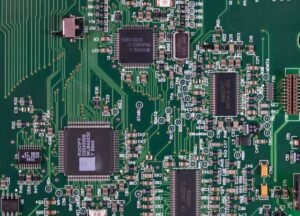Can I Get AI?
Artificial Intelligence (AI) has become an increasingly popular topic, but many people wonder if they can have access to this cutting-edge technology. The good news is that AI is not just reserved for large corporations or tech giants. In this article, we will explore how individuals and smaller businesses can benefit from AI and what options are available to them.
Key Takeaways:
- AI is not limited to large corporations or tech giants.
- There are various ways for individuals and smaller businesses to access AI technology.
- Cloud-based AI services offer an affordable and accessible option.
- DIY solutions and open-source frameworks provide flexibility for AI development.
Options for Accessing AI
1. **Cloud-based AI Services:** One of the easiest ways to get AI is to take advantage of cloud-based AI services provided by major tech companies like Google, Microsoft, and Amazon. These services allow you to access pre-trained AI models and easily integrate them into your applications through simple APIs.
2. **DIY AI Development:** If you have the necessary technical skills, you can develop and train your own AI models. There are several open-source libraries and frameworks available, such as TensorFlow and PyTorch, that provide all the tools you need to build AI applications from scratch.
3. **AI Marketplaces:** Another option to access AI is through online marketplaces. These platforms connect AI developers with individuals or businesses in need of AI solutions. You can find a wide range of AI services, from chatbots to image recognition systems, on marketplaces like AI-ON and Algorithmia.
Benefits of Cloud-based AI Services
1. *Cloud-based AI services offer convenience and scalability.* These services provide a ready-to-use infrastructure that significantly reduces the time and effort required to set up and maintain AI systems.
2. *Affordability and cost-effectiveness.* Cloud-based AI services often offer pay-as-you-go pricing, allowing you to only pay for the resources you use. This makes AI accessible for individuals and smaller businesses without the need for substantial upfront investments.
3. *Access to cutting-edge technology.* Cloud providers constantly update their AI services, ensuring you have access to the latest advancements in AI without needing to maintain your own infrastructure.
Comparison of Cloud-based AI Services
| Cloud Provider | Main AI Services | Pricing Model |
|---|---|---|
| Google Cloud AI | Cloud Vision API, Dialogflow, AutoML | Pay-as-you-go |
| Microsoft Azure AI | Cognitive Services, Bot Framework, Azure Machine Learning | Pay-as-you-go and subscription options |
| Amazon AWS AI | Rekognition, Lex, SageMaker | Pay-as-you-go |
Each cloud provider offers a unique set of AI services and pricing models. It’s important to compare the offerings to find the one that best suits your specific AI requirements and budget.
Considerations for DIY AI Development
- Open-source frameworks like TensorFlow and PyTorch provide powerful and flexible options for developing custom AI models.
- DIY AI development requires a strong understanding of machine learning algorithms and programming skills.
- Training AI models from scratch can be time-consuming and computationally intensive.
Conclusion
In conclusion, AI is no longer exclusive to large corporations or tech giants. Individuals and smaller businesses can now access AI through cloud-based services, DIY development, or AI marketplaces. Cloud-based AI services offer convenience, affordability, and access to cutting-edge technology. DIY development provides flexibility and customization options, but requires technical expertise. Whatever option you choose, AI has the potential to revolutionize your business and drive innovation.

Common Misconceptions
Misconception 1: AI is Only for Big Companies
One common misconception surrounding AI is that it is exclusively reserved for large corporations with significant resources. However, this is far from the truth. AI technologies have become increasingly accessible and affordable, making them available to businesses of all sizes.
- Small businesses can leverage AI tools to improve customer service and automate repetitive tasks.
- Individuals can access AI-powered applications and virtual assistants on their smartphones.
- AI has been integrated into various industries, including healthcare, finance, retail, and manufacturing.
Misconception 2: AI Will Replace Human Jobs
Another misconception is that AI will completely replace human workers, leading to widespread unemployment. While AI undoubtedly automates certain tasks, it also creates new job opportunities and enhances human productivity.
- AI technologies can free up humans from mundane and repetitive tasks, allowing them to focus on more creative and complex endeavors.
- New roles, such as AI trainers and data annotators, are emerging to support the development and training of AI systems.
- AI can augment human capabilities and decision-making, leading to increased efficiency and productivity in various industries.
Misconception 3: AI is All about Robots
A common misconception is that AI is all about humanoid robots like those portrayed in science fiction movies. While robots can be powered by AI, AI itself is not limited to robotics.
- AI encompasses a broad range of technologies, including machine learning, natural language processing, and computer vision.
- AI systems are prevalent in software applications, recommendation engines, virtual assistants, and autonomous vehicles.
- AI can be implemented in non-physical forms such as chatbots or algorithms that improve search engine results.
Misconception 4: AI is Infallible and Can Solve Everything
Some people believe AI to be infallible, capable of solving all problems and making perfect decisions. However, AI systems are not immune to limitations, biases, and errors.
- AI systems heavily rely on the quality and diversity of data they are trained on, making them susceptible to biases and inaccuracies present in the data.
- AI systems may struggle with understanding context and sarcasm, leading to potential misinterpretations in natural language processing tasks.
- AI should be seen as a tool that requires human judgment and oversight to ensure ethical and responsible decision-making.
Misconception 5: AI Possesses Human-like Intelligence
Although AI has made remarkable progress, it does not possess human-like intelligence. AI systems excel in specific tasks, but they lack the general cognitive abilities and consciousness present in humans.
- AI systems are designed to narrow their focus on well-defined tasks, whereas human intelligence is multifaceted and adaptable.
- AI lacks common sense reasoning and the ability to understand complex social dynamics in the same way humans do.
- AI systems require extensive training and large amounts of data to perform well, while humans can learn and adapt much more quickly.

AI Adoption by Industry
AI has become increasingly prevalent across various industries. The table below showcases the adoption rate of AI technologies in different sectors.
| Industry | AI Adoption Rate |
|---|---|
| Finance | 72% |
| Healthcare | 67% |
| Manufacturing | 55% |
| Retail | 48% |
| Transportation | 41% |
Top AI-Enabled Countries
The race for AI supremacy is a global phenomenon. The table below highlights the countries leading the way in AI research and development.
| Country | AI Research Output |
|---|---|
| United States | 34.4% |
| China | 25.4% |
| United Kingdom | 9.8% |
| Germany | 8.2% |
| Canada | 6.1% |
AI Job Market
The rapidly evolving field of AI has created numerous job opportunities. The table below displays the average salary for AI-related positions.
| Job Title | Average Salary |
|---|---|
| Data Scientist | $126,927 |
| Machine Learning Engineer | $120,931 |
| AI Research Scientist | $119,715 |
| AI Product Manager | $116,833 |
| AI Software Developer | $112,483 |
AI in Entertainment
AI technologies are transforming the entertainment industry. The table below showcases the use of AI in different forms of media.
| Media Type | AI Application |
|---|---|
| Film | AI-assisted editing |
| Music | AI-generated compositions |
| Gaming | AI-powered NPCs |
| Virtual Reality | AI-enhanced simulations |
| Advertising | AI-driven personalization |
AI in Education
AI is revolutionizing the educational landscape. The table below presents the benefits of AI integration in educational settings.
| Benefit | Description |
|---|---|
| Personalized Learning | Adapts to individual student’s pace and style |
| Smart Tutoring | Provides intelligent and interactive assistance |
| Automated Grading | Efficiently assesses student work and provides feedback |
| Content Recommendation | Suggests relevant study materials and resources |
| Virtual Laboratories | Offers immersive and risk-free practical learning |
AI in Transportation
AI-powered systems are reshaping the transportation industry. The table below presents the impact of AI technologies on transportation.
| Domain | AI Application |
|---|---|
| Self-Driving Cars | Enhanced safety and convenience |
| Traffic Management | Optimized flow and reduced congestion |
| Logistics and Shipping | Efficient route planning and automation |
| Public Transportation | Improved scheduling and predictive maintenance |
| Ride-Sharing | Enhanced matching algorithms and pricing |
AI Ethics Concerns
The rapid advancement of AI has raised various ethical considerations. The table below highlights some of the key concerns.
| Concern | Description |
|---|---|
| Privacy | Collection and usage of personal data |
| Bias and Discrimination | Unfair treatment based on demographic factors |
| Job Displacement | Potential loss of employment due to automation |
| Transparency | Understanding and explaining AI decision-making |
| Autonomous Weapons | Moral implications of AI-driven weaponry |
AI-Powered Personal Assistants
AI assistants have become an integral part of daily life. The table below compares popular personal assistants.
| Personal Assistant | Company | Slogan |
|---|---|---|
| Siri | Apple | “Your intelligent assistant” |
| Alexa | Amazon | “Just ask” |
| Google Assistant | “Your own personal Google” | |
| Cortana | Microsoft | “Your personal digital assistant” |
| Bixby | Samsung | “A smarter way to use your phone” |
AI in Agriculture
AI technologies are reshaping the agricultural sector. The table below showcases the applications of AI in agriculture.
| Application | Description |
|---|---|
| Precision Farming | Optimizes resource allocation for better yields |
| Smart Irrigation | Monitors soil moisture levels and adjusts watering |
| Pest Monitoring | Identifies and tracks pests for early intervention |
| Automated Harvesting | Efficiently collects crops with AI-powered machines |
| Crop Disease Detection | Identifies diseases early for targeted treatment |
In this era of technological advancement, AI has rapidly become a prominent force across various industries. As depicted by the tables, AI adoption rates are high in finance, healthcare, manufacturing, and retail. The United States and China are leading the global AI race with significant research output. The AI job market presents attractive salary packages in roles such as Data Scientists and AI Research Scientists. From entertainment to education, transportation to agriculture, AI is infiltrating diverse sectors, enhancing productivity and transforming user experiences. However, ethical concerns like privacy and job displacement require careful consideration. As AI continues to evolve, it holds immense potential to shape our future.
Frequently Asked Questions
What is AI?
AI stands for Artificial Intelligence. It refers to the development of computer systems that can perform tasks that would typically require human intelligence, such as visual perception, speech recognition, decision-making, and problem-solving.
How can AI benefit me?
AI has the potential to benefit individuals and society in various ways. It can enhance efficiency, automate repetitive tasks, improve accuracy, provide personalized experiences, and assist in decision-making processes. AI technology can be utilized across industries such as healthcare, finance, transportation, and entertainment.
Can I have my own AI assistant?
Yes, there are AI assistants available that can be customized and tailored to individual needs. These assistants can help with tasks like managing schedules, answering questions, providing recommendations, and even controlling smart home devices.
Do I need technical knowledge to use AI?
While having technical knowledge can be beneficial for certain AI applications, many AI tools and platforms are designed to be user-friendly and accessible to individuals without extensive technical expertise. You can explore various AI-related applications and services that cater to different user skill levels.
What are the ethical concerns surrounding AI?
AI raises ethical concerns regarding privacy, data security, bias, job displacement, and the potential for misuse. It is important to consider these issues and ensure that AI technologies are developed and used responsibly, with proper regulations and safeguards in place.
How can I learn AI?
Learning AI can be done through various means. You can enroll in online courses, attend workshops or conferences, read books and research papers, and participate in AI-related communities and forums. Many universities and educational institutions also offer AI programs and degrees.
What are some popular AI frameworks and tools?
There are several popular AI frameworks and tools that developers use to build AI applications, such as TensorFlow, PyTorch, Keras, scikit-learn, and Microsoft Cognitive Toolkit. These frameworks provide libraries and APIs that simplify the development and deployment of AI models.
Is AI dangerous?
AI itself is not inherently dangerous, but its potential misuse or lack of proper governance can raise concerns. It is important to have regulations and ethical guidelines in place to ensure the responsible development and use of AI technology.
Can AI replace human intelligence?
While AI can perform certain tasks with incredible efficiency and accuracy, the goal of AI is generally to augment human intelligence rather than replace it entirely. Human intelligence encompasses complex aspects such as creativity, emotional intelligence, and contextual understanding, which AI is still developing.
How can I implement AI in my business?
Implementing AI in your business depends on your specific needs and resources. You can start by identifying areas where AI can enhance efficiency, improve decision-making, or provide personalized experiences. Consult with AI experts or service providers to analyze your requirements and develop tailored solutions.




